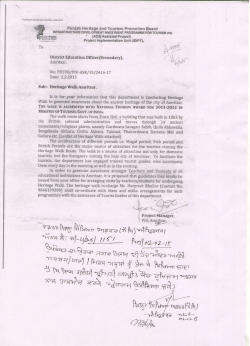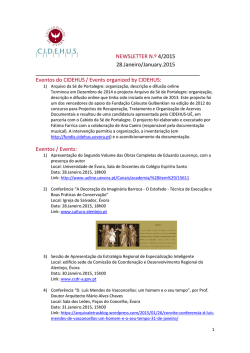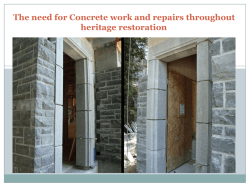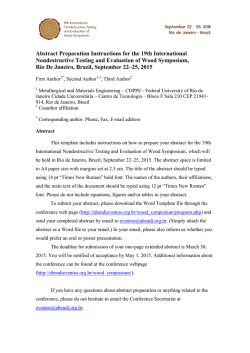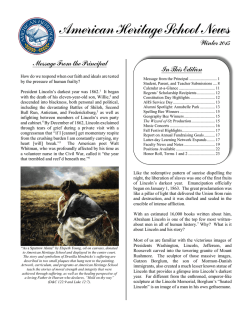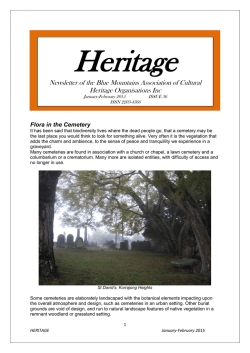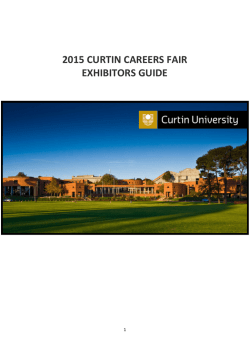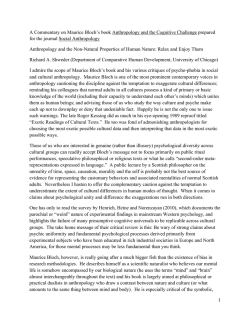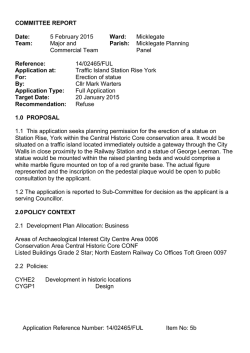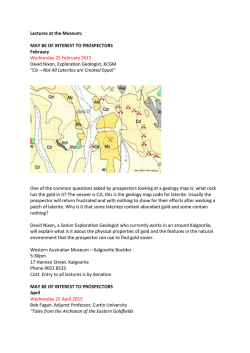
NEWSLETTER 3_21Janeiro
NEWSLETTER N.º 3/2015 21.Janeiro/January.2015 ________________________________________________________ Eventos do CIDEHUS / Events organized by CIDEHUS: 1) "E-Government - Por um novo modelo de Estado na Sociedade da Informação", pelo Dr. Luís Vidigal (APDSI) Local: TEMPO - Teatro Municipal de Portimão Data: 24.Janeiro.2015, 15h00 Link: https://www.facebook.com/pages/Entre-Arquivos/675331035821806?fref=ts Eventos / Events: 1) Cerimónia de assinatura do Protocolo para a constituição do Centro UNESCO Património Mundial de Évora Local: Sede do Grupo Pró-Évora Data: 22.Janeiro.2015, 10h 2) Palestra “Movimentos Sociais e Geopolítica da Indignação: Brasil e Espanha em perspectiva comparada” (Breno Bringel) Local: Sala Polivalente, ICS-ULisboa Data: 21.Janeiro.2015, 14h30 Link: http://www.ics.ul.pt 3) CONFERÊNCIA “Entre a Europa e o Brasil: os artistas brasileiros na passagem do século XIX ao XX”, com a Professora Ana Cavalcanti Local: Universidade de Évora, Palácio do Vimioso, sala 205 Data: 22.Janeiro.2015, 16h00 Link: http://www.chaia.uevora.pt/pt/event/205/conferencia-com-a-prof--anacavalcanti.html 1 4) Conferência “Por um dicionário das mestiçagens ibero-americanas - antigos conceitos contra anacronismos modernos”, por Eduardo França Paiva, Universidade Federal de Minas Gerais, Belo Horizonte e comentada por Manuel Lobato, Centro de História, IICT Local: Arquivo Histórico Ultramarino Data: 22.Janeiro.2015, 17h30 Link: http://www2.iict.pt/?idc=236&idi=24809 5) Encerramento do 4º Ciclo de Conferências – Relações Luso-Italianas Local: Embaixada de Itália em Lisboa, Palácio Conde de Pombeiro Data: 28.Janeiro.2015, 18h30 Link: http://www.cham.fcsh.unl.pt/ac_actividade.aspx?ActId=181 6) Jornada de História da Arte Local: Auditório da Junta de Freguesia de Bucelas Data: 21.Fevereiro.2015 Link: https://www.bensculturais.com/snbci-noticias/753-igreja-matriz-de-bucelas-opatrimonio-artistico 7) CURSO de Paleografía Online: "Escrituras del pasado. Paleografía de las Edades Media y Moderna" Data: 17 a 27.Março.2015 (35 horas) Link: http://paleografia.hypotheses.org/1409 Call for articles: 1) Call for Contributors: Cultural Heritage Activism, Politics and Identity: Heritage Movements in Asia. Original contributions invited to be considered for inclusion in an interdisciplinary collection of essays about contemporary heritage movements in Asia. Editors Dr Ali Mozaffari, Postdoctoral Research Fellow, Australia-Asia-Pacific Institute, Curtin University (Australia) Dr Tod Jones, Senior Lecturer in Geography, School of Built Environment, Curtin University (Australia) 2 The Scope of the Volume This book examines the formation of heritage movements within contemporary Asian societies. Heritage is a social process with linked tangible and intangible aspects. It has been defined as the use of the past for the purposes of the present, which indicates its potential for formation and contestation of collective identities at multiple geographical and hierarchical scales, from neighbourhoods to nation-states and global networks. Heritage processes vary according to cultural, national, geographical, and historical contexts. Heritage politics reveals the variety of responses by public and privately constituted groups to certain global challenges of late modernity including nationalism, pluralism, state-society relations and the influence of a growing middle class. Activists and activist groups have long engaged in the process of heritage production and designation. Their activities, although varying in degrees of organisation, are made possible through the shifting limits of the public sphere. Also, they must be considered in a broader context of evolving discourses of cultural and national identity, cultural policies of the state, and the political opportunities it provides for participation. This book will examine instances collective activism in heritage under the rubric of heritage movements. As a working definition, a heritage movement comprises collective challenges (to elites, authorities, other groups or cultural codes) by people with a common purpose and solidarity to protect and conserve heritage as conveyor and basis for collective identity, through sustained interactions with elites, opponents and authorities. The book takes a broad interpretation of the geographical expanse of Asia; the boundaries of which may be loosely located in the west in Iran and the Persian Gulf, Central Asia and Afghanistan and in the east and China and Indonesia. Within this broad geographical expanse, various nation-states have witnessed rapid change as a result of economic growth and development, the creation of new states, and variable economic growth. In speaking of contemporary Asia, we note that the timing of these movements too varies among these countries, although in most instances they seem to have appeared in the past 30 years. For example, the post-Soviet era and subsequent geopolitical transformations in the region (and beyond) have brought a change in the balance of political and cultural power. For instance, recent developments in Central Asia have encouraged expressions of various dormant and re-invented identities. While officially heritage continues to be designated, formed and managed by the state, other citizen groups and societies are forming who engage with the state or even pursue their own alternative heritages. In instances these groups may refer to historical (such as Persian) affiliations or religious (such as Muslim) roots or a combination of the two. The activities of these groups may be designated under the rubric of heritage movements. This book is premised on three observations. First, contemporary heritage movements in the region occurred within the state defined spectrum of political opportunities and often engaged with state and international heritage projects within their respective countries. Second, many of these movements are recent and may become more prominent as international perspectives on heritage has advocated for the importance of participatory processes. Third, heritage discourses in the region seem to have been influenced by the increasing number of professionals in heritage or related professions (architecture, design, and archaeology) with knowledge of approaches to heritage in Europe in particular. 3 This book explores state-society relations through heritage, the political opportunities that are presented (or accidentally created) for public participation in heritage and identity making and the reaction and or reception of cultural policies of the state. It also examines relationships between different groups, changing communication technologies, and international networks. As such chapters are inspired by the application (explicitly or implicitly) of concepts articulated in social movements theory in the field of cultural heritage. Current contributors Current contributions include (but are not limited to): Dr Ali Mozaffari (Curtin University), focussing on Iran; Dr Tod Jones (Curtin University), focussing on Indonesia; Professor Michael Pinches (University of Western Australia), focussing on the Philippines; Dr Imran Tajuddin, Assistant Professor (National University of Singapore), focussing on Malaysia The editors are happy to consider more than one paper on a country. Submissions Abstract submission: 28 February 2015 Notification of contributors: March 2015 First submission of manuscripts: August 2015 Response/feedback to first submissions: October 2015 Final manuscript submission: December 2015 Please send abstracts of no more than 500 words and a current CV (or link to profile online) to both editors as below: Dr Ali Mozaffari: [email protected] Dr Tod Jones: [email protected] 2) Portuguese Studies Review Special Theme Issue: Landscape with Battle Scene in Background, 1415: Ceuta and Agincourt Data limite: até 25 de Março de 2015 3) Cadernos do Arquivo Municipal n.º 4 “Ceuta e Lisboa - 600 anos” Prazo limite: 31.Julho.2015 Link: http://arquivomunicipal.cm-lisboa.pt/pt/investigacao/cadernos-do-arquivomunicipal/call-for-papers/ Call for papers: 1) VII Encontro Ibérico EDICIC 2015 Local: Madrid Data: 16 e 17.Novembro.2015 Prazo limite: 12.Fevereiro.2015 Link: http://edicic2015.org.es/index.php/inicio/edicic2015 2) 4.º Congresso dos Estudantes Lusitanistas da Polónia “Cruzamentos: relações entre a Polónia e os países de língua portuguesa” Local: Varsóvia 4 Data: 13 e 14.Abril.2015 Prazo limite: 16.Fevereiro.2015 Link: http://www.instituto-camoes.pt/lingua-e-cultura/congresso-dos-estudanteslusitanistas-polonia 3) “Intercultural Poetics. Literary Representations of ‘The Foreign Other’” Local: Universidade do Minho Data: 18 e 19.Junho.2015 Prazo limite: 28.Fevereiro.2015 Link: http://cehum.ilch.uminho.pt/interculturalpoetics2015 4) Congresso de Humanidades Digitais em Portugal Local: Faculdade de Ciências Sociais e Humanas da Universidade Nova de Lisboa Data: 8 e 9 de Outubro de 2015 Prazo limite: 15.Março.2015 Link: https://congressohdpt.wordpress.com/ 5) International conference «Art & Science in the Early Modern Low Countries» Local: Amesterdão Data: 17 e 18.Setembro.2015 Prazo limite: 15.Abril.2015 Link: http://arthist.net/archive/9189 6) International and Interdisciplinary Conference of AHLiST 2015 Local: CHSC, Universidade de Coimbra Data: 19 a 24.Novembro.2015 Prazo limite: 15.Junho.2015 (As propostas mais céleres serão muito valorizadas) Link: http://www.ahlist.org/ Atividades Culturais / Cultural activities: 1) Sessão HAJA QUEM CANTE -TERTÚLIA à volta do CANTE ALENTEJANO com JANITA e VITORINO SALOMÉ A iniciativa integra-se no âmbito das actividades organizadas a propósito da recente inscrição do Cante na lista do Património Imaterial da Humanidade da UNESCO. Local: Colégio Mateus de Aranda – Sala dos Espelhos (Rua do Raimundo - Évora) Data: 22.Janeiro.2015, 19h30 Link: www.cultura-alentejo.pt 2) Visita guiada à exposição “Tão alto quanto os olhos alcançam”, por Delfim Sardo Local: Fórum Eugénio de Almeida Data: 24.Janeiro.2015, 17h00 Link: 5 3) Exposição ENTRE MARGENS: 150 ANOS DO TRATADO DE LIMITES PORTUGAL ESPANHA (1864) Projecção do filme O SILÊNCIO, de António Loja Neves e José Manuel Alves Pereira. Estarão presentes na sessão o realizador António Loja Neves e Paula Godinho, investigadora do Instituto de História Contemporânea da UNL. Local: sala de conferências do edifício da Torre do Tombo Data: 30.Janeiro.2015, 17h00 Link: Bolsas / Estágios / Emprego Científico / Oportunidades / Scholarships / Opportunities: 1) Recrutamento: Consultor/a para realização de estudo sobre o património arquitetónico do arquipélago dos Bijagós - Guiné-Bissau Prazo limite: 12.Fevereiro.2015 Link: http://www.imvf.org/ficheiros/file/tor_patrimonio_arquitetonico_dos_bijagos.pdf No âmbito do projeto Bijagós, Bemba di Vida! Ação cívica para o resgate e valorização de um património da humanidade implementado pelo Instituto Marquês de Valle Flôr (IMVF) e pela Organização Não Governamental guineense Tiniguena e cofinanciado pela União Europeia e pelo Camões – Instituto da Cooperação e da Língua, I.P. está aberto o seguinte concurso para recrutar um/a consultor/a para realização de um estudo sobre o património arquitetónico do arquipélago dos Bijagós, na Guiné-Bissau. Os candidatos interessados deverão enviar Curriculum Vitae acompanhado de proposta metodológica e financeira (tendo em consideração o facto de que despesas com deslocações, alojamento e seguro de assistência em viagem serão asseguradas pelo IMVF), até dia 12 de fevereiro de 2015, para ambos os endereços eletrónicos: 6 [email protected] (Filipa Petrucci, IMVF) e [email protected] (Emanuel Ramos, Tiniguena). 2) Bolsas de doutoramento: IMPRS ANARCHIE - Ph.D. opportunities in Social Anthropology, Archaeology and History The International Max Planck Research School for the Anthropology, Archaeology and History of Eurasia (IMPRS ANARCHIE), a cooperation between the Max Planck Institute for Social Anthropology and the Martin Luther University Halle-Wittenberg, offers: Openings for PhD students starting 1st of October 2015 The aim of ANARCHIE is to renew transdisciplinary agendas in fields where sociocultural anthropologists, archaeologists, and historians have much to gain from crossfertilisation. While the first and the second cohorts of PhD students are conducting research in the fields of collective identifications and religion and ritual respectively, the third cohort will explore inequality and social change, with a particular focus on economic and demographic drivers. For the purposes of ANARCHIE, Eurasia is defined as the super-continent which comprises the whole of Asia and the whole of Europe. Current projects range from Britain and Spain to Mongolia and Vietnam. The IMPRS ANARCHIE is open to students from all countries and offers an international threeyear PhD program in a stimulating research environment. Highly motivated M.A. graduates in Social Anthropology, Archaeology, History or a related discipline are encouraged to apply. Partner Institutions The Max Planck Institute for Social Anthropology is one of the world’s leading centres for research in social anthropology. Common to all research projects at the Max Planck Institute is the comparative analysis of social change; it is primarily in this domain that its researchers contribute to anthropological theory, though many programmes also have applied significance and political topicality. Martin Luther University Halle-Wittenberg (MLU) – for more than 500 years a place of scientific enlightenment, academic development and future-oriented research – is the largest university in the state of Saxony-Anhalt. The historical departments of the MLU specialize in the study of transnational spaces and the analysis of social, political and cultural transformation processes in a longue durée perspective. Staff are active in systematic comparative research in both European and extra-European contexts. Archaeologists at the MLU investigate Europe and the Mediterranean region in its Eurasian context. Of particular interest are large-scale communication systems which facilitate the movement of knowledge, persons and goods. Essential Duties & Responsibilities Students will obtain their doctorate in one of the three disciplines, but will participate in a common programme organised jointly by social anthropologists (Department “Resilience and Transformation in Eurasia” of the Max Planck Institute for Social Anthropology), historians (the Institutes for History and for the Study of the Ancient World of the Martin Luther University Halle-Wittenberg), and archaeologists (Institute for Art History and European Archaeology of the Martin Luther University HalleWittenberg). ANARCHIE is embedded in other institutions of the Martin Luther University, notably the University’s International Graduate Academy. The IMPRS is in certain circumstances ready to consider joint supervision of PhD projects with colleagues based at institutions outside Halle. The group will work together in Halle/Saale (except when undertaking field or archival research elsewhere, the costs of which will be covered). 7 Financial Support The PhD positions/grants offered here will be awarded for up to three years. (Grants are not taxed and they are free from social security stipulations). Application dates Please submit your application electronically by 28 February 2015 following the link for vacancies on our homepage. Final selection will be made following interviews (provisional) in May 2015. Link: http://www.eth.mpg.de/cms/en/imprs/anarchie/application.html Lançamento de Livros / Revistas / Boletins / Índices de Periódicos / Books launches: 1) Studia Historica. Historia Moderna Vol 36 (2014): Duelo entre colosos: el Imperio Otomano y los Habsburgos en el siglo XVI Link: http://recyt.fecyt.es/index.php/STHI/issue/view/shhmo201436 2) Subsídios para a História do Baixo Guadiana e dos Algarves Daquém e Dalém-mar, de Fernando Pessanha Data: 26 de Janeiro (segunda feira), às 19:00 horas Local: Salão da Biblioteca Provincial de Huelva. Link: https://lamardelibros.wordpress.com/2015/01/14/apresentacao-de-subsidiospara-a-historia-do-baixo-guadiana-e-dos-algarves-daquem-e-dalem-mar-de-fernandopessanha/ 3) Chronica nova: Revista de historia moderna de la Universidad de Granada Año: 2014, Número: 40. Dedicado a: Ejército y sociedad en la España Moderna Link: http://dialnet.unirioja.es/servlet/revista?codigo=399 Prémios Científicos / Prizes: 1) Segunda Edição do Concurso de Ensaio Filosófico Prazo limite: 26.Janeiro.2015 Link: https://filosofianacatolica.wordpress.com/concurso-de-ensaio/ 8
© Copyright 2026
